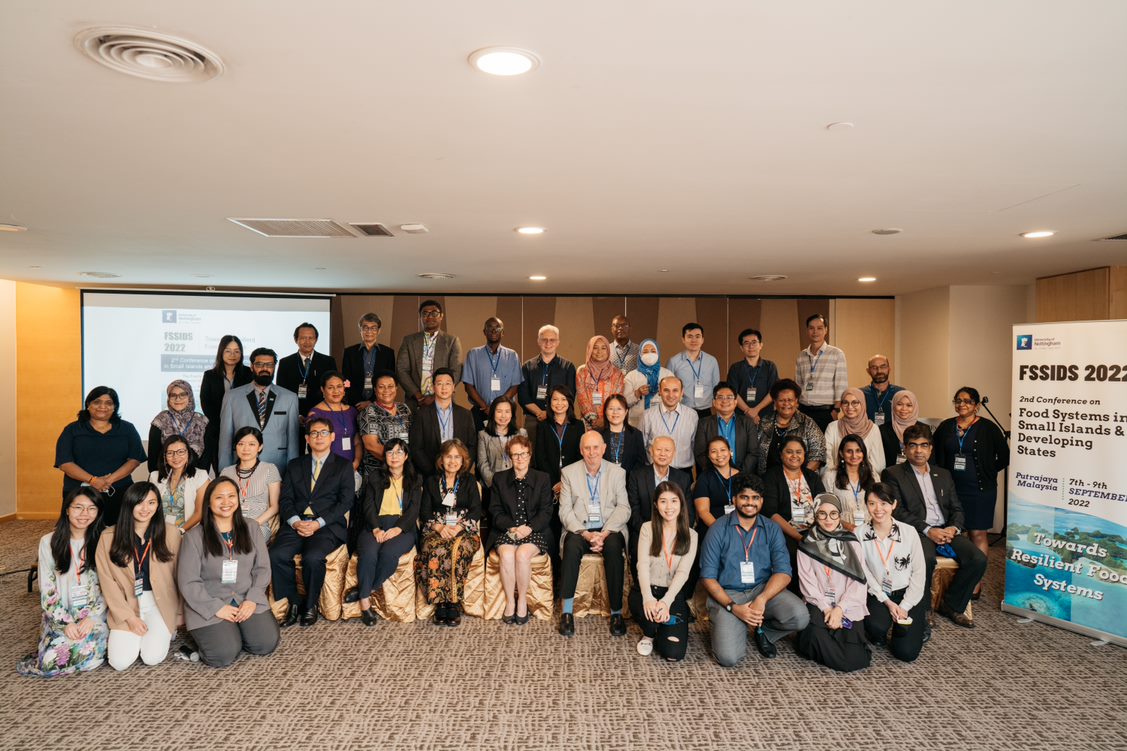
October 17, 2022, by Lexi Earl
Food Systems in Small Islands and Developing States conference
This post is written by Dr Chin Chiew Foan, Associate Professor in Plant Biology, based at the University of Nottingham Malaysia.
The Food Systems in Small Islands and Developing States conference 2022 (FSSIDS 2022) was held at The Everly Putrajaya Hotel, Kuala Lumpur, Malaysia from 7-9 September 2022. There were more than 50 participants from 10 countries at the conference, including delegates from Malaysia, Indonesia, Vietnam, Philippines, Thailand, Singapore, Fiji, Samoa, the UK and Australia. This was the second FSSIDS conference following our first successful online workshop held in September 2020. The 2nd FSSIDS 2022 conference was conducted in hybrid mode, being both in person as well as online.
The opening ceremony of the 2nd FSSIDS 2022 conference was officiated by Professor Sarah Metcalfe, Provost of the University of Nottingham Malaysia (UNM). Her welcoming speech was followed by a brief introduction to UNM research by the UNM Vice-Provost for Research and Knowledge Exchange, Professor Andy Chan. The Chair of the conference, Associate Professor Dr Chin Chiew Foan, then gave opening remarks for the conference.

Prof Sarah Metcalfe, giving her welcoming speech to the Food Systems in Small Islands and Developing States conference
The FSSIDS 2022 conference programme was organised around several themes: current challenges in maritime or marine food systems; science-policy interface; innovations for sustainable food systems; and food cultural diversity. Conference sessions included several keynote lectures and talks by a range of experts in specific fields linked to the conference themes. The final session of the conference was a breakout discussion exploring potential future collaborations between conference participants.
As food systems are influenced by many complex factors, it is necessary to adopt multi-level approaches to address the challenge. The conference participants included social scientists, crop scientists, policy makers, community workers, nutritionists, environmentalists and marine biologists, who all looked at challenges in food systems from various angles, thus providing essential interdisciplinary perspectives.
One of the discussion topics of the conference was the impact of modernization on traditional and cultural practices of food systems, for example, the threat of the appearance of supermarkets on decentralized fresh food distribution systems (such as the roadside vendor network in Tonga) and its impact on healthy eating. The participants explored the value of the preservation of traditions alongside the introduction of innovative technologies to improve the sustainability of small island food systems. The key role of women in food production and preparation was highlighted, as was the need for improved nutritional education to ensure diets are both healthy and sustainable. Concern was also expressed about the reduced interest of young people in being involved in primary food production and, as a result, the increasing age demographic of farmers.
There were active and lively discussions from the participants throughout the conference. It is clear that the food systems within small island states are particularly vulnerable to climate change, agricultural pests and international food markets. Many such islands suffer the dual burden of nutrient deficiencies and obesity (and associated diseases such as type 2 diabetes and cardiovascular disease). In the last session it was agreed that future workshops should be arranged to develop specific applications for research funding to address some of these problems. It was also agreed that a 3rd FSSIDS conference should be arranged and there was widespread support for the idea that this should be hosted in Fiji.
The conference was closed by Professor Andrew Salter, who thanked the participants for their excellent contributions and expressed support of the Future Food Beacon in forging future collaborations. Anyone wanting to join the Food Systems in Small Islands and Developing States network can find more information here.
No comments yet, fill out a comment to be the first

Leave a Reply